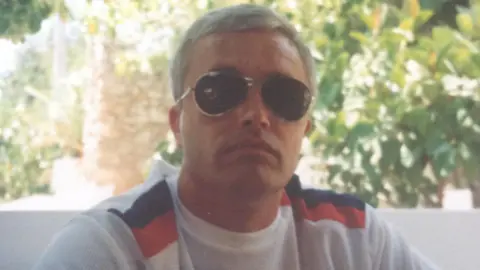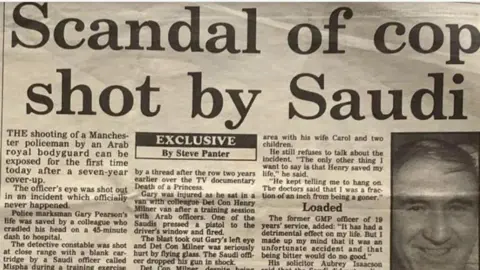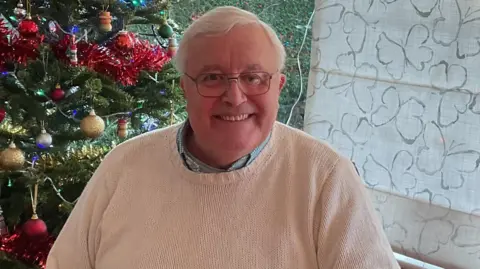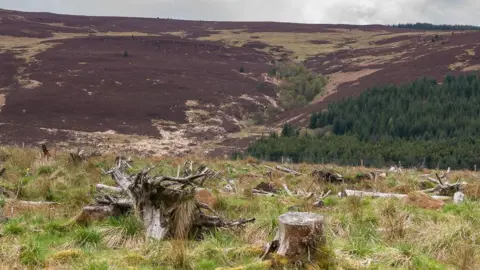'Hushed-up shooting mishap changed my police career'
 Gary Pearson
Gary PearsonPolice marksman Gary Pearson was a highly respected firearms officer who was once even selected to guard Pope John Paul II during a visit to Manchester in 1982.
But just over a year later his life was in tatters, with half of his face blasted away and one of his eyes destroyed after a horrific training ground shooting incident that remains largely unexplained.
Pearson and a colleague were taking a break from the training course they were leading for bodyguards from Bahrain and Saudi Arabia, in the remote Kielder Forest on the border of Northumberland and Scotland.
For reasons that have never become clear, one of the Saudi trainees aimed a gun at the van they were sitting in and fired a shot.
The Greater Manchester Police (GMP) armed protection officer and firearms instructor was training the overseas candidates in anti-ambush techniques to guard "high end individuals".
They were issued with .38 revolvers and blank ammunition but some kind of accident or malfunction with the weaponry caused a projectile to be fired from the trainee's gun.
Accident or freak mishap - the shot struck and badly injured Pearson, curtailing his police career.
 Manchester Evening News
Manchester Evening NewsPearson later claimed he was never informed about any investigation and was left in the dark about the perpetrator and whether he ever explained his actions.
He later sued the force and received a £45,000 out-of-court settlement, although GMP did not accept liability.
The force has expressed "regret" for how Mr Pearson was treated and insisted if the incident happened today officers would receive much greater support.
Recalling the moments before the injury, Mr Pearson told how he saw the trainee run out from the bushes and round to the driver's side window.
"Next thing I saw was him pointing a gun at me and there was a bang and I felt like I had been punched in the face," he said.
 Gary Pearson
Gary PearsonHis colleague, who was also wounded, had expertise in dealing with bullet wounds as an ex-Royal Marine, which probably saved Mr Pearson's life.
Now 71, the former officer said he was still mystified by the unexplained incident and even Freedom of Information requests submitted to GMP failed to reveal more about what happened.
The left side of his face had to be rebuilt and he was given prosthetic eye.
GMP kept him in an office-based role but he was later retired on medical grounds in 1989.
He claimed at one stage a senior officer had told him to "keep quiet" about the incident for fear of creating a diplomatic dispute with the Saudi government.
His shooting came three years after an ITV drama-documentary called Death Of A Princess, which explored the injustices of the execution of a young Saudi Arabian princess.
 Ian Capper/Geograph
Ian Capper/GeographIn a diplomatic row that followed, the UK ambassador was sent home and export licences were refused to UK firms for a time, with heightened tension between the two countries.
News of Mr Pearson's experiences was first published in 1990 when a Manchester Evening News reporter ran his story as a front page exclusive following a conversation with Mr Pearson, who by then was working as court usher.
Mr Pearson said he was then telephoned by his former-boss who "swore at me and asked why I had spoken to the press".
He feels GMP failed in its duty of care, and has recently chosen to back a new campaign to formally recognise officers who suffer life-changing injuries on duty.
There are calls for the officers to be commended in a similar way to the new Elizabeth Emblems given for those who are killed.
"It was only this campaign that has made me want to talk about it again although it is very traumatic," he said.
"I don't feel any hate. I decided early on I wasn't going to let something like this ruin what I had. I had a wife and a young lad.
"I wasn't going to sit in a chair and become bitter and twisted."
'Keep quiet'
The father-of-two, who also has four grandchildren, used to live in Prestwich but now resides in Newark, Nottinghamshire, and remains adamant the incident will not define his life.
"To be honest I have no feelings about it. I just want to enjoy my life and my family," he said.
The new campaign - backed by 84 MPs - was devised by retired Sussex detective Tom Curry, who has written Eyeshot - 40 Year Search for the truth, a book telling Mr Pearson's story.
Citing the presentation of Elizabeth Emblems to two GMP officers killed in a gun and grenade ambush, he said: "If either of those two brave officers had been left in a wheelchair or on life support they would have received no recognition."
He said the campaign has been extended to all emergency personnel.
GMP said substantial changes had been made to staff welfare in the years that followed Mr Pearson's experience.
A force statement said: "While it is of immense regret that Mr Pearson and his family were treated this way, we know that if an officer was to encounter an incident of this nature today they would receive the very best care and support."
It said there was "a thorough investigation" and a decision was taken "not to authorise charges" against the trainee involved.
The Cabinet Office said the government would be happy to consider the case for any new medal or award, "subject to comprehensive assessment across relevant departments".
Listen to the best of BBC Radio Manchester on Sounds and follow BBC Manchester on Facebook, X, and Instagram. You can also send story ideas to [email protected] and via Whatsapp to 0808 100 2230.
